

Project «Voices of Jewish settlements. Vitebsk region.»פיתוח קשרי התרבות בין העמים של ישראל ובלרוס
|
|---|
Website search |
|
MainNew publicationsContactsSite mapVitebsk regionMogilev regionMinsk regionArkady Shulman
|
Arkady ShulmanTHE RIGHTEOUS WOMEN OF GORODOKI met these women 15 years ago, when I, together with historian Mikhail Ryvkin, was making a book about the people, who had saved Jews in the years of the Holocaust.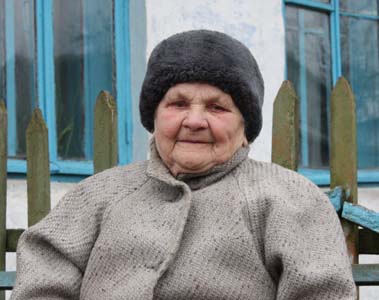 Valentina Aleksyevna Glushneva.
Valentina Aleksyevna Glushneva.
Story oneValentina Alekseyevna Glushneva (Prokofieva) will turn 89 on September 30th 2009. She was expecting us in her wooden house to tell us about the events which took place almost 70 years ago. Before the war she lived in Gorodok. Next to her house lived the Shofmans. Old Nohim Shofman was a shoemaker. Aleksey Prokofiev made boots and repaired shoes. In both the families the women were housewives. In 1921 Nohim’s first wife died of dysentery. She left 6 children behind. The youngest daughter was only a year and a half. Seven years later his second wife died of consumption and two more children remained without a mother. (The youngest Sora was a year old). Shofman’s elder children started moving to Leningrad one after another. Prokofiev’s elder daughter also went to study in Vitebsk. The Shofmans’ and Prokofievs’ younger children spent every day together. In 1940 Nohim Shofman fell seriously ill. All that time his daughter Sora lived at the Prokofievs’ house. When Nohim died, his elder daughter Sonia returned to Gorodok with her family and Sora moved in with them. 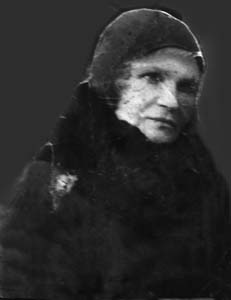
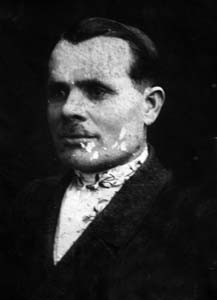 Yelena Tikhonovna abd Aleksey Ananievich Prokofiev.
Yelena Tikhonovna abd Aleksey Ananievich Prokofiev.
Valentina Alkseyevna came home for a holiday on June 18th 1941. Nobody could predict at that time that for 4 years she would not be teaching in a school but saving children from death. Aleksey Prokofiev was a smart man – on the very first days of the war he told his family: “We need to get out of here”. He told the same to his neighbors. However, Sonia and her husband Israel did not realize the danger. They said: “What can the Germans do to us? We do not have a lot of money, neither do we have gold. They will not touch us.” The Prokofievs left Gorodok and took Sora Shofman with them. They only managed to reach Bychiha. The Nazis were everywhere, so they had nothing else to but return home. 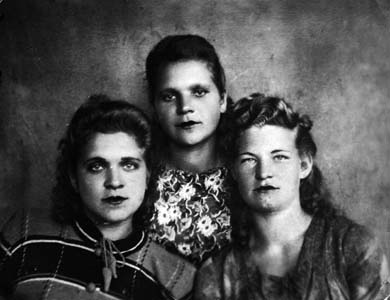 Sora Shofman (in the center) and the Prokofiev sisters.
Sora Shofman (in the center) and the Prokofiev sisters.
The terrible time of occupation began. Soon a ghetto was established in Gorodok. Aleksey warned Sora against going to the ghetto. He told she needed to hide herself somewhere because she was blue-eyed and blond – she did not look Jewish at all. Once, at the beginning of the occupation Sora came home. At that time Nazis where questioning Israel – her sister’s husband. As they saw the girl they asked who she was. Sora was silent, so Israel said she was his wife’s sister. The Germans looked bewildered and asked: “Is your wife Russian then?” Israel nodded. Then one of the Nazis took Sora by the hand, walked her out of the house and said: “Don’t live with the Jews, otherwise you will be killed. Go to any Russian house and live there.” Sora did go to the ghetto, though. She decided she should be near her family. Of course, she could not suspect what fate expected the ghetto residents. When the executions began, the men were murdered first. Israel was killed as well. Sonia, her daughter and Sora remained in the ghetto. However, after the first execution Sora escaped from the ghetto. She did not have hesitations as to where to go – she went directly to the Prokofiev’s house. Sora stayed at their house for several months. The neighbors were aware who the girl was. One of them reported to the Nazis that she was a Jew, so she realized she was putting everyone’s life at risk. She had to leave and headed for Leningrad. However she was caught by Germans and sent to work in Germany in 1943. She was liberated in 1945 by American troops. Sora came back to Gorodok and again stayed at the Prokofiev’s house for a while, because her house had been turned into military headquarters. In 1947 Sora found her relatives in Leningrad and moved there. Valentina Prokofieva worked at a school for 33 years. They still keep in touch with each other. 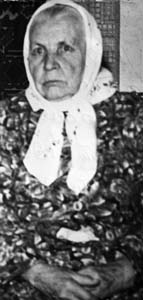 Anna Karpovna Korago.
Anna Karpovna Korago.
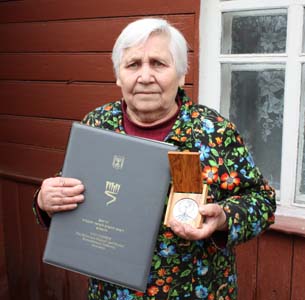 Olga Vasilievna Korago.
Olga Vasilievna Korago.
Story twoI first met Olga Vasilievna Korago in 2001. Our next meeting took place eight years later. She is 85, but still full of energy. She told me how she had gone through the war: When the war began I was 16 and my mother – 38. Mother was acquainted with Fania Turnianskaya. Fania was a good tailor and used to make dresses for me and my mother. I knew Fania’s daughter Galia well – we were friends. 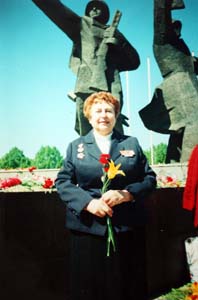 Galina Alpatova (Turnianskaya).
Galina Alpatova (Turnianskaya).
At the beginning of the war we somehow lost connection with the Turnianskys. At that time we lived in a street which was mainly Jewish. Our neighbor Sonia, my mom’s friend had to move to the ghetto. So I brought her bread to the ghetto. Once I saw Galia behind the ghetto wire. She told me her father had been shot. “What am I to do?” – she asked me. What could I answer to her? I came home and told the whole story to my mom. Mother was a truly kind-hearted woman. She said: “Let’s walk there in the evening, maybe we will be able to somehow take her out from the ghetto.” - Did she know you could be shot for hiding Jews? - Certainly. We both knew. Everyone knew about it – there were posters all around the town. So, that evening we headed for the ghetto. I took a jacket so that Galia could put it on and no one would see the yellow strip on her clothes. We managed to get her out of the ghetto. Galia stayed with us for two months. As soon as someone approached our house, she had to hide in the basement. Mother had friends in a village nearby. The Korolevs had no children, so she asked them to shelter Galia. She managed to convince them that Galia did not look Jewish – she had blond hair. So, Galia stayed with them for a month. She did not go outside and hid herself in the basement. The Korolevs soon felt that the Nazis started suspecting something, so they sent Galia to Yevdokia Bodiago, who lived in another village with a baby. So, Galia was taken to live there and babysit. Later she also Only after the war Galina found out that Yegor and Yekaterina Korolevs were murdered by fascists for connections with the partisans and hiding a Jewish girl. In return for their heroic deed Galina took their last name and became Galina Koroleva until she got married. Olga Vasilievna Korago showed me papers, photos and letters between her and Galia. After marriage Galia lived in Riga. She is currently residing in the US. She has two daughters, three grandchildren and a great granddaughter. 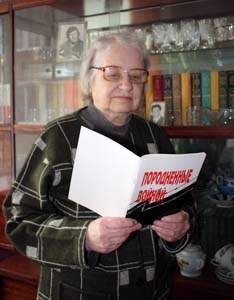 Valentina Alekseyevna Zagnetova.
Valentina Alekseyevna Zagnetova.
Story threeThey were walking in a long column. Among them there was a small girl, Ida Dobromyslova. Her mother was walking next to her, carrying a baby in her arms. All the men in that family had been already killed. Mother was talking to Ida quietly: - Listen to all I will tell you now and be silent. She was talking to the nine-year-old Ida as if she were an adult. I fact, Ida had to become an adult within several weeks. She had no other choice. - When the guards are not next to you, step onto the pavement and start walking in the opposite direction. Do not look back and do not run. You have to walk quietly. 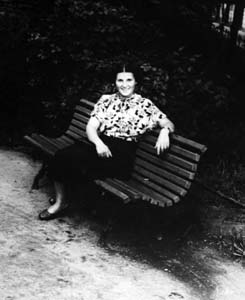 Ida Dobromyslova.
Ida Dobromyslova.Photo taken in the middle of the 1950s. 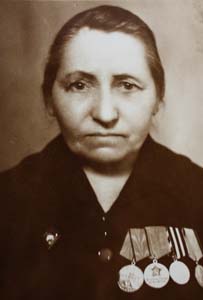 Nadezhda Fedorovna Zagnetova.
Nadezhda Fedorovna Zagnetova.Photo taken in 1966. Ida managed to escape. First she got lost in the crowd. Most probably there were people who saw her walking out of the column but said nothing. Even though Ida did not look Jewish, everyone in the village knew whose daughter she was. Ida remembered her mother’s words: - Go to Vyshitky, to the teacher – she will help you. And so Ida did. Nadezhda Fedorovna Zagnetova knew Ida’s family very well. Every time she came to Gorodok for teachers’ conferences, she stayed at their house. She was a widow and had a daughter. Her daughter, Valentina, is now 72. She has lived her whole life in Gorodok. - Mother and I used to live in Vyshitki, which was twenty kilometers away from Gorodok. Once, at night, mother heard someone making sounds in the corridor, near the oven. There we saw Ida. - Ida, what’s happened? – mother asked. We did not know on that day the Nazis had executed all the Jews in Gorodok. – Why are you silent? Why are you not coming in? Ida was trembling and could not pronounce a word. Only a while later, when she warmed up, she told us about what had happened in Gorodok. Ida remained to live with them. In order to prevent the neighbors from seeing her, Nadezhda prohibited both Ida and her daughter to leave the house. The girl stayed with us for about a month. Then it turned out one of the neighbors knew about Ida, so it was not safe to continue living like that. Several days later mother sent Ida to a village called Dubikovo, where a good acquaintance of hers lived. She accepted the girl into her family. Later partisans came and took Ida to a safe place. She was sent to an orphanage and was there until the end of the war. After the war she found some relatives in Leningrad and moved there. Later she found her rescuers and visited them every year in Gorodok. Valentina Glushneva’s interviewOlga Kotago’s interviewValentina Zagnetova's interview |
|||
|
|
Jewish settlements in Vitebsk regionVitebsk • Albrehtovo • Babinovichi • Baran • Bayevo • Begoml • Beshenkovichi • Bocheikovo • Bogushevsk • Borkovichi • Braslav • Bychiha • Chashniki • Disna • Dobromysli • Dokshitsy • Druya • Dubrovno • Glubokoye • Gorodok • Kamen • Kohanovo • Kolyshki • Kopys • Krasnopolie • Kublichi • Lepel • Liady • Liozno • Lukoml • Luzhki • Lyntupy • Miory • Obol • Oboltsy • Orsha • Osintorf • Ostrovno • Parafianovo • Plissa • Polotsk • Prozorki • Senno • Sharkovshina • Shumilino • Sirotino • Slaveni• Smolyany • Surazh • Tolochin • Ulla • Verhnedvinsk • Vidzy • Volyntsy • Yanovichi • Yezerishe • Zhary • Ziabki • |
Main |
New publications |
Contacts |
Site map |
Vitebsk region |
Mogilev region |
Minsk region |